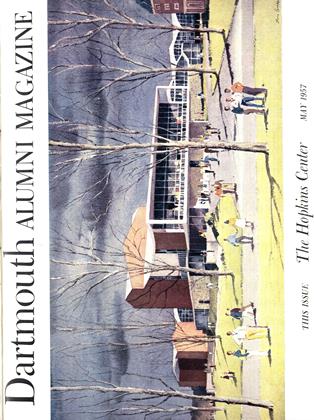WHEN the details of the new curriculum with its three-term, three-course program were published last month, Provost Donald Morrison commented upon the significance of the changes and pointed out how they were planned to shift the emphasis at Dartmouth from dependence upon teaching to independence in learning. The first building on the campus that by design and organization will reinforce this determination to make the Dartmouth student increasingly responsibly for his own education will be the Hopkins Center.
The impact that Baker Library made upon learning at Dartmouth will be matched in force, though far different in form, when the Center opens its many doors. Even though the written and spoken word can now be reproduced and transmitted in seconds, man does not communicate by words alone. A simple definition of an educated man would be one who can be communicated with, and who can communicate to others. Dartmouth is now going to bring those other tools of communication - art, drama, music and crafts - out of the backrooms, attics and cellars around the campus where they have been talking to themselves. They will be brought together around the new aesthetic and social crossroads of the College. A basic premise behind a liberal arts education is the interrelatedness of all knowledge and culture. The Hopkins Center will enable us to demonstrate this concretely in its physical arrangement, in its working organization and in its educational program.
A beautifully designed, ingeniously planned, completely equipped group of specialized buildings will not of themselves add to the excellence of the Dartmouth education. The combination of the new facilities and a distinguished faculty will. The men now teaching in the fields to be represented in the Center have been operating effectively for many years in substandard conditions and in isolation. The extra vitality to be gained by having them teaching together in specially designed facilities will be great.
BUT even a great building with great teachers does not ensure superlative results. It will be the responsibility of the Educational Director of the Center to coordinate the activities, exhibitions, projects and programs taking place in the Center so that all the facilities of the buildings and all the talents and knowledge of the faculty and all the enthusiasm and energy of the students are exploited to the utmost. All-Center programs will be organized often and will give life to the hope which Provost Morrison expressed of "enabling students to learn without being taught," and to his further desire that education at Dartmouth be a cooperative adventure of student and student, and student and teacher.
If it is true that the only education worthy of the name is self-education, the Hopkins Center emerges as a unique educational tool which will reach and shape, to a degree, the life of every man on the campus. The thirty years of dreaming and scheming, the moments of disappointment have not been in vain. In its metamorphosis from just a large theater, as it was originally conceived, to its present concept as a true cultural center, the Hopkins Center has become as concerned with the education of the whole undergraduate body in depth and breadth as was the man for whom it has been named.
 View Full Issue
View Full Issue
More From This Issue
-
 Feature
FeatureExciting Theater Ahead
May 1957 By WARNER BENTLEY -
 Feature
Feature"An Open-Arms Aspect ..."
May 1957 By ANN HOPKINS POTTER -
 Feature
FeatureThe Man Who Designed the Center
May 1957 By ROBERT L. ALLEN '45 -
 Feature
FeatureDramatics
May 1957 By PROF. HENRY B. WILLIAMS -
 Feature
FeatureA New Dimension in Dartmouth Education
May 1957 -
 Feature
FeatureA Stimulus to Town Development
May 1957 By PROF. HUGH S. MORRISON '26,
JOHN R. SCOTFORD JR. '38
-
 Letters to the Editor
Letters to the EditorLETTERS
JUNE 1959 -
 Letters to the Editor
Letters to the EditorLetters to the Editor
November 1976 -
 Letters to the Editor
Letters to the EditorLetters
JUNE • 1986 -
 Books
BooksSHOW ME THE WAY TO GO HOME.
January 1960 By JOHN R. SCOTFORD JR. '38 -
 Article
ArticleGall Him "Danny" and He's Yours
APRIL 1991 By John R. Scotford Jr. '38 -
 Cover Story
Cover StoryThe Tasting
MARCH 1995 By John R. Scotford Jr. '38
Features
-
 Feature
Feature"I Am Having a Wonderful Time"
DECEMBER 1962 -
 Feature
FeatureEat Here
February 1992 By CHRIS WALKER '92 and TIG TILLINGHAST '93 -
 Feature
Feature"ring O bells!"
November 1974 By ELIZABETH F. MOORE -
 Cover Story
Cover StoryAs We See It
JUNE 1999 By Julian Okwu '87 -
 Feature
FeatureAffirmative Action
April 1977 By MARY ROSS -
 Cover Story
Cover StoryWorries of a Premed
JUNE 1997 By Tyler Stableford '96

